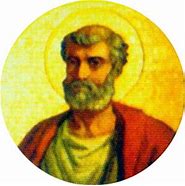
POPE SAINT STEPHEN I
A Roman by birth, Stephen’s father was Jovius. after that we know nothing of Stephen until Liber Pontificalis, the ancient book of the popes, describes him as an archdeacon under Pope Lucius I. As Lucius assumed that he would be martyred, he appointed care of the Church into the hands of Stephen.
Although there were no persecutions during his papacy, Stephen had his hands full with internal arguments. Several years before his papacy, the Decian persecutions had killed many Christians. Many of those who had survived, had done so by either buying certificates attesting to their sacrificing to the Roman gods, or denying that they were Christians at all, or actually taking place in these Roman sacrifices. Not all of those who survived this way were happy with their decisions. Many wanted to return to the Church. Novation, a priest of Rome who claimed to be bishop, preached that these people were not capable of returning to communion with the Church. Marcianus, bishop of Arles, was one of the bishops who had saved himself in this fashion. The bishops of Gaul wanted Marcianus be deposed. St. Cyprian, bishop of Carthage, primary bishop of Africa, wrote to Stephen asking for this. We are not sure if Stephen took care of this, but the ancient list of bishops of Arles does not include Marcianus’ name.
In the meantime, two bishops of Spain, Martial and Basilides, were deposed due to their self-defense during the persecutions. After the persecutions ended, Basilides went to Rome to plea his case before Stephen and returned home with letters of recommendation. He tried to get his bishopric back. Martial assumed that if it was good enough for Basilides, it was good enough for him. Thus, he defended the right of bishops to appeal to Rome. The bishops turned to St. Cyprian to write to Stephen, explaining why Stephen was wrong. A council of African bishops took up the subject and claimed that Stephen, being “situated at a distance and ignorant of the true facts of the case” had been deceived. Nothing further is known of the outcome.
Another problem Stephen faced was whether baptism by members of a splinter group, for example, Novation’s followers, was valid. The African council and St. Cyprian insisted not. St. Stephen insisted that as long as the baptismal formula was technically correct, the baptism was valid and there was no need to be re-baptized. Stephen was the first bishop to use St. Peter as an argument for Rome’s primacy. Stephen’s argument prevailed over time. And, thus, was set the precedent that any sacrament correctly administered by a properly ordained priest or bishop is technically valid, even if the priest or bishop is heretical or excommunicated.
Like previous Roman bishops, in the largest city in the empire, Stephen used the wealth of the Roman church to relieve the sufferings of churches in distant parts of the empire. He was said to help “all the provinces of Syria and Arabia”.
Pope Stephen died on August 2, 257. Although, for years, he was said to have been martyred, more recent studies to not support that. He was buried in the burial grounds of St. Callixtus and transferred years later to a monastery erected in his honor.
Pope St. Stephen, pray for us.


Recent Comments